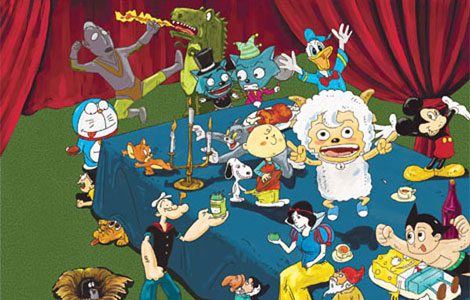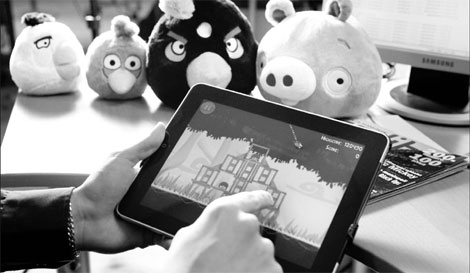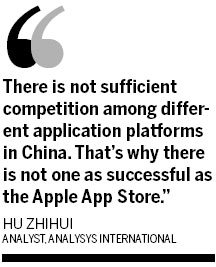Business
What's the next hit after Angry Birds?
Updated: 2011-04-04 15:35
By Tuo Yannan and Chen Limin (China Daily)
|
Graphics for the Angry Birds computer game on an Apple Inc iPad at the headquarters of the game's developer, Rovio Mobile Oy in Espoo, Finland. Rovio is a star Finnish start-up in a country struggling to fill the gap left by the declining value of its best-known company, Nokia Oyj. The game can also be downloaded by iPhone and is very popular among Chinese subscribers. Henrik Kettunen / Bloomberg |
Gamers and investors ponder what will overtake the top-ranking iPhone, iPad and iPod application
BEIJING - If you haven't tried the popular game application Angry Birds, you have been missing out. As the hottest iPhone/iPad/iPod Touch application in 2010, the small birds have drawn masses of attention from users, investors and even filmmakers.
People around the world have spent an estimated 200 million minutes playing the game, according to Peter Vesterbacka, head of Rovio Mobile Ltd, the Finnish developer that created the blockbuster. Someone, somewhere has it on their screen at any given moment.
While the application is currently a global phenomenon, some are wondering what the next smash hit will be. Since China, the world's biggest mobile market, has a large number of application developers, will the next "Birds" fly out of the country?
"Angry Birds is one of the latest to join the pantheon of 'casual games' that have appealed to a mass audience with a blend of addictive game play, memorable design and deft marketing," said the Wall Street Journal in a story analyzing the soaring popularity of the game, whose developer recently received $42 million from venture capital investors.
Talent and creative design are key elements for a successful application. Boasting both of these in abundance, Angry Birds has long been the most downloaded application in devices running on Apple Inc's operating system. Apple's application store is the largest by application numbers, with more than 250,000 available for users.
In China, more and more applications are coming on to the market as sales of smartphones and tablet computers soar. However, "although the number of applications is huge in China, the lack of variety is a problem for developers", said Zhang Yue, chief executive officer of iBokan Wistom Co Ltd, a Chinese application design company in the United States market.
He said the entry barrier for becoming an application developer is low, but it is very hard to stand out from thousands of applications without a brilliant idea.
This, in turn, leads to a hard life for many application developers. According to a report by domestic research company Analysys International, Chinese developers earn less compared with those in other countries. About 30 percent of application developers are losing money, while about 20 percent earn less than 10,000 yuan ($1,525) a month.
Some of the developers have become trainers to make the most out of the application industry.
Zhang's company started as an application development business, but since late 2009 it began to provide training services based on Apple's operating system and Google's Android counterpart. Training contributed a quarter of its total revenues last year, according to Zhang, but this is expected to rise to 75 percent in the years to come because "many Chinese developers don't do well in user experience and design, which leads to many market opportunities".
Zhang said more than 20 of its trainees have been offered positions at Internet conglomerate Tencent Holdings Ltd in a recent recruitment drive.
A mature market environment is another key element for growing solid applications.
|
|
Angry Birds is the No 1 paid-for application on the Apple App store in 68 countries. According to a news story from Wired in March, Rovio received 20 million paid downloads through iPhones, iPads and iPods, and 20 million advertisement-supported free downloads on the Android system, both of which generated similar revenues. Officially, it costs $0.99 for the iPhone version and $2.99 for the iPad version in China and 59 pence in the United Kingdom.
In China, about 40 percent of the developers' income comes from advertisements, which is the main revenue generator, according to Analysys International. In other countries, paid downloads are the main source of income.
"It is very hard to make a living in the Chinese market because Chinese customers do not have the habit of paying for applications," said Zhu Lianxing, chief executive officer of application development company Beijing Apple Pie Tech Co Ltd. His company is one of the earliest Apple application design companies in China, launched in 2008.
"Jail-breaking" and piracy hurt the industry. In the Chinese gray market, when customers buy electronic devices, vendors usually offer them software that helps them bypass charging systems. These are known as jail-breakers.
Developers are also exposed to the risk that their ideas may be copied by others, because many will follow suit when a good idea or application comes out, said Hu Zhihui, an analyst with Analysys International. This was witnessed with the advent of the country's group-buying industry, which saw more than 1,000 websites dedicated to the practice spring up since last year after the US company Groupon Inc pioneered it and became popular.
A good market environment provides a win-win model for both developers and device makers. "Applications are significant for customers when choosing a product. Good applications definitely have a positive effect on cell phone sales," said Zhu.
As a result, device producers and telecommunication carriers, including Apple, Hewlett-Packard (HP) Corp, Google Inc and China Mobile Ltd, have launched projects to encourage and attract developers to create applications on their platforms.
China Mobile, for example, said that this year it will provide 200 hours of free training and other benefits for application developers so they can develop and test their work.
The way many platforms operate is not sufficiently professional, which can hinder the growth of good applications, said a chief executive of a Chinese development company who declined to be named.
He said on many platforms, some rather ordinary applications get good exposure and are highly recommended to users because their developers have good relationships with the platform operators.
"There is not sufficient competition among different application platforms in China. That's why there is not one as successful as the Apple App Store. This also prevents good applications from becoming known and downloaded by users," said Hu.
He added that it was "certainly possible" that applications as popular as Angry Birds will come from China. However, it is unlikely they will be created by individuals, but rather by big companies that have more resources.
China Daily
Specials

Fill dad's shoes
Daughter and son are beginning to take over the family business of making shoes.

Have you any wool?
The new stars of Chinese animation are edging out old childhood icons like Mickey Mouse and Hello Kitty.

Virtual memorial
High-Tech touches to traditional tombsweeping festival help environment

